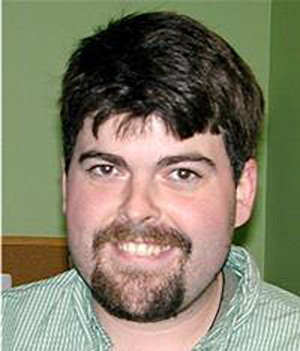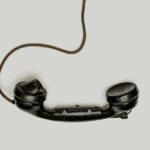NOT ANOTHER TV DAD
★ ★ ★ ★
MANAGING MY ANXIETY

By CL Bledsoe
I have anxiety and clinical depression. The depression is difficult and acts kind of like a constant background noise, but the anxiety, though less constant, is much more debilitating. It only pops up from time to time, but when it does, it dominates my experience. For me, the most stressful thing about anxiety isn’t the thing I’m anxious about; it’s the buildup and the aftermath. The thing, itself, when it finally happens, usually isn’t even that bad.
Let’s say I have to do a presentation for an executive audience at work. I do these every few weeks. There’s a myth that anxiety comes from lack of preparation. Anxiety isn’t a rational reaction, so to understand it, you have to examine it from a different perspective. If you don’t have anxiety, you probably don’t understand how all-consuming anxiety can be. Maybe a week out, I’ll notice I’m having trouble sleeping, eating, and focusing on things. Mind you, this isn’t because I’m obsessing about the presentation—I may well not be thinking about it at all, consciously.
There’s the presentation, itself, to prepare. I’ve learned that I have to do this as soon as I know it’s coming. If I put it off, my anxiety will get worse and worse until I won’t be able to even think about the presentation in anything approaching a rational way. It’s kind of like trying to hear what someone is saying while there’s a giant noise machine running. The best I can hope for is to get the gist of it, or, to bring it back to the presentation, if I wait too long to start, the best I’ll be able to do is a rough approximation. The best way to approach this is to immediately do as complete a draft of the thing as possible and come back to it as often as possible to revise and improve it. But this won’t help me feel less anxious, at all. It only means I get the work done.
As the day approaches, my stomach becomes a black hole. It feels like it’s imploding. Sometimes, eating will help, momentarily. But, at this point, I’m usually not hungry. Eating just gives the acid something to do. This might last for a week, pretty much nonstop. Medicine may help, or it may not, depending on how my anxiety goes that day. If I think about it too much, nothing will help. Sleeping is similar. I’m probably not going to sleep much that week.
On the day, I’m as prepared as I can be. I’ve practiced the presentation multiple times, gone through it multiple times. Of course, my anxiety is so distracting, that I may have missed something, but that’s why I went through it so much. By the time I do the presentation, I’ve probably gone through it an embarrassing number of times. It usually goes well, and from the outside, no one could tell how difficult this process has been.
The flipside is a situation that I have no control over—something I can’t prepare for. In that situation, I will try to pretend it doesn’t exist. This doesn’t really help, and my body will not cooperate with this charade. I’ll still be unable to sleep, have stomach trouble, and generally be miserable leading up to the thing.
Just because the thing is over doesn’t mean I magically feel better, either. The aftermath of anxiety is exhaustion. I’ve just been in a heightened state for maybe a week. I’ve done the presentation, or whatever, and now I have to go back to my life. I will be useless for the rest of that day, but that doesn’t mean I don’t still have to do things. I just probably won’t do them particularly well. The upside is that I probably lost some weight. The downside is that I was miserable for a week.
The really fun thing about anxiety is that it can be triggered by all kinds of random things. A presentation, sure, that makes sense, but what about going to a movie or even the store? All of these things have triggered my anxiety.
So how do I manage it? As I said before, I know myself well enough to recognize triggers, so whenever I have to do something unpleasant, I try to get it done as soon as possible. I’m the guy who pays his taxes as soon as I receive my W2s, or does the cybersecurity training module at work on the day it’s assigned, even though I have six months; or turns in my grades a week early. This isn’t because I’m so organized; it’s because I know that if I put it off, I’ll start freaking out. It’s just not worth being miserable. You may be thinking that none of these things seem like they should be particularly stressful, and you’re right. But again, that’s not how anxiety works. To be honest, there are plenty of really hard things I’ve done or do frequently that don’t bother me at all. This has all made me exceptional at time management in certain scenarios and absolutely terrible in others. It’s also made me a workaholic in certain ways and a total slacker in others. Sometimes, I do wish I could utilize my anxiety in a meaningful way. Imagine being able to skip sleeping or eating, just focusing on one task. But anxiety overwhelms with its focus; it’s more about obsessing than work ethic. Work ethic is what I’ve had to learn to compensate for my anxiety.

CL Bledsoe is the author of sixteen books, most recently the poetry collection Trashcans in Love and the flash fiction collection Ray’s Sea World. His poems, stories, and nonfiction have been published in hundreds of journals and anthologies including New York Quarterly, The Cimarron Review, Contrary, Story South, and The Arkansas Review. He’s been nominated for the Pushcart Prize fifteen times, Best of the Net three times, and has had two stories selected as Notable Stories of the Year by Story South‘s Million Writers Award. Originally from a rice and catfish farm in the Mississippi River Delta area of Arkansas, Bledsoe lives with his daughter in northern Virginia. He blogs at NotAnotherTVDad.blogspot.com

DEAR READER
At The Wild Word we are proud to present some of the best online writing around, as well as being a platform for new and emerging writers and artists.
If you have read the work in The Wild Word and like what we do, please put something in our tip jar.
THANK YOU FOR YOUR SUPPORT!
























0 Comments